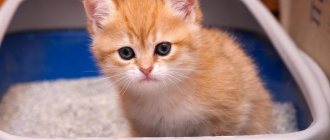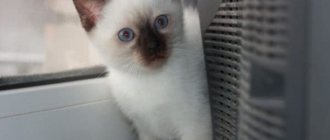Stories about cats that strangled newborns can safely be called tales. The animal does not pose any threat to the child, and if we act correctly, it will not even become jealous. Cats and newborn children are quite capable, if not of becoming friends, then at least of coexisting peacefully, without creating problems for each other.
What are they afraid of?
Why does such a problem appear before the birth of a child: cats and newborn children. There are several reasons :
- possible allergy to cat fur; according to statistics, this pathology occurs quite rarely, but if such a situation arises, the animal can always be isolated;
- a cat can become a spreader of infection, but only if it lives both at home and outside.
© shutterstock
The last one is very significant. There is a common belief that cats should be allowed outside. But this is not so, because this is a domestic animal for which the territory that it controls is important, in this case, this is the area of the apartment or house. Side factors that encourage a cat to go outside can easily be overcome: by sterilization, at least of the cat, and drug intervention (sedative drops) for the cat.
This procedure is completely painless for a cat, and for a person’s conscience it is absolutely calm, since, having taken an animal to live in a house, we are obliged to fulfill some formalities, otherwise it is better not to take responsibility for the animal.
If we can’t arrange a cat’s life, then why are we trying to have a child? Communication between a cat and a newborn is inevitable after the baby appears in the house. These creatures are very curious, and having become members of the family, they are also jealous, so you need to prepare your pet for the arrival of a new resident of the house.
What scares us
In fact, our worries are not groundless, but before you decide to say goodbye to your beloved animal, read the article to the end.
Our very first fear is pain. Some animals, especially cats, due to the characteristics of hunters, can be carriers of various kinds of diseases.
The main thing is not to be alarmed, this mainly applies to those cats who were picked up from the street, who constantly walk anywhere, they collect all the bacteria when catching rats, through dirty soil, from other animals, and also from eating raw meat. Those who only have cats at home and have vaccinations are not in danger, except that allergies or the bad character of the animal will be the biggest problem.
If you hear the words of relatives, friends, or read rumors that having an animal, especially cats, during your pregnancy and especially after childbirth is dangerous due to toxoplasmosis, then first let’s figure out what it is...
Toxoplasmosis is an infectious disease, its development is associated with the entry of the Toxoplasma parasite into the blood. Most often, the disease passes without symptoms. And one of the reasons for infection may be communication with infected animals. In turn, the animal becomes infected either through other infected people (rats, street cats), or through feeding on raw meat or eggs.
But if you have the idea that you can only become infected through animals, this is wrong. A person is also at risk by eating raw or poorly processed foods, dealing with dirty soil, and birds. This is a reason to conclude that the problem will not only lie with the animal. As a rule, you can become infected from a cat only in the first 2-3 weeks of the disease.
As for animals that are not allowed outside, the risk of infection is very small, and it depends on what the pet is fed and whether it is allowed to communicate with other animals at close range.
In addition to Toxoplasmosis, manifestations of the presence of harmful bacteria in a cat are possible, such as lichen, cat scratch disease, and helminthiases. These are fairly common diseases.
As for allergies , everything is a little more complicated. Here you can’t change the cat’s diet, and you can’t lock him at home with lots of vaccinations. A child either has an allergy or does not. And you should not believe the words of breeders that there are non-allergenic breeds, this is used as a marketing ploy. The allergy may not manifest itself upon first contact, this is worth knowing.
And this is the case when you can justify your decision to find another home for the cat, but not to get rid of it or take it away, but to find a good owner. Yes, the second requires time, which will decrease with the advent of a child, but by throwing cats anywhere, you betray him, thereby destroying his faith in love. In addition, as you know, cats get used not to people, but to their place of residence, and this will be a huge stress for him. It will be the most difficult for domesticated cats to adapt to the street; they do not catch rats, do not know how to hide from bad weather, do not know what a car is and whether they should be afraid of it. And spending a little time for the sake of a happy life for a child is quite possible.
Animals in the house where the baby is born, in principle, have a positive effect on the environment. Dangerous moments are minimized if the cat is healthy and has no allergies. Most often, in this case, worries arise in those whose pet has a bad character. But for this there is no reason to look for another home for him. After all, there are many places that even send trainers to your home and can help curb the bad behavior of your four-legged friend.
Thus, if your furry pet is domesticated, does not wander anywhere, is calm and you constantly give it all the necessary medications, then it is unlikely that this will have a bad effect on your child (only if the baby is not allergic). Quite the opposite is positive. And making their coexistence pleasant is quite possible.
Preparation
Cats are quite tolerant of newborn children if you prepare them in advance for the arrival of a new member of the community that lives in this house or apartment. To do this, you need to take the following preventive measures :
- for a cat, one of the main stresses is noise, which is inevitably associated with the appearance of a newborn baby in the house, so you need to accustom the animal in advance to these loud sounds that a baby makes when inviting friends who have small children home;
- accustom your pet to the sounds of a rattle, give the opportunity to smell those substances and objects that will be associated with the child: powder, baby cream, lotion, shampoo, cats receive almost half of the information through smell;
- You need to talk with your pet about future changes, naming the name of the future child, if it has already been chosen.
For a pet, the appearance of a new family member, especially one of such small size, will always be a surprise to which he needs to get used to.
© shutterstock
Life with a cat is a happy home
Cats, of course, are not dogs that wag their tails and lick everyone. Cats have a temper, but if they love their family, then this love is unique.
A cat in the house has a positive effect on the development of the baby and his upbringing. According to psychologists, communication with a furry friend helps a child become more responsible and friendly. In addition, children who grew up with animals from infancy are most often very kind. But if your home doesn’t yet have an animal under 3 years old, don’t rush to buy one. But if you have already managed to get a kitten, then remember that he and his relationship with the baby will require attention.
There is no need to worry about the cleanliness of the house until it is sparkling. It is quite enough to pay a little more attention than usual to cleaning the tray with gloves, changing the filler more often, washing the bowl and changing the water in it every day, washing your hands and not giving the cat raw meat. For those who are worried about the cat's shedding, they now offer to shave the cat, this is very convenient, since for 1.5 months you do not need to vacuum up a bunch of fur every day.
Building relationships
The baby was brought home. And the first thing the cat sees is not the envelope in its hands, but the owner. The happiness of having treats in the house, three meals a day and affection for the cat at this moment is like a pink veil before the eyes. And then he hears it... the cry of a baby. And here the cat becomes alert, hisses and rolls back.
Young parents make the mistake of immediately mistaking this for hostile behavior and no longer allow the cat near the baby. In fact, this is a completely understandable reaction, since cats react very strongly to noise and are distrustful of everything new. Besides, they are very curious. Hissing is more of a defensive reaction in this case than a manifestation of unfriendliness.
And after 10 minutes you can already see the picture of the “fluffy” one carefully approaching the baby. This is where the defensive reaction kicks in, not from the cat, but from the parents. And they try to hide their little bundle as far as possible from the clawed paws. But it's not right. In this situation, the cat is interested in understanding what is in the diaper and whether it poses a threat. And slowly creeping up, they are only worried about what will happen to them.
Cats have a genuine interest in everything new until he is sure of his safety or until this item becomes commonplace for him. Therefore, you should not drive the cat away from the child. On the contrary, it is worth allowing the cat to approach the baby under close supervision. And smell it. Thus, he makes sure that this lump does not pose a threat to him.
If you initially treated the cat as a “child,” then during pregnancy it is time to prepare the cat for the fact that less time will be spent on him, otherwise a sharp decrease in care may cause jealousy. If the attachment to the expectant mother is stronger than to the others, it is worth establishing relationships with the cat among other family members. It is worth teaching your cat to be independent.
Cats often exhibit a maternal instinct towards children. They come to the defense if the child cries, teach him to go to the potty, and help very young children develop a grasping reflex. Cats can also be protective. Become a child's friend.
Tips for those who have a cat and a baby in the house
- First of all, before the baby is born, take your cat to see a veterinarian. Let him be examined, given all the necessary vaccinations, and wormed. If you are not offered to take all the tests, ask for it yourself.
- If you were planning castration or sterilization, then you should do this also before the birth of the child. The first couple of days the cat may behave aggressively, but then they become more affectionate and pliable as problematic sexual behavior disappears.
- Buy your cat more toys and a claw sharpener. Get into the habit of trimming your cat's nails every couple of weeks. If fur falls off, take him for a haircut.
- You can invite friends with children to visit in advance so that the cat remembers what the children look like and their behavior. Accustom your cat to the sounds of rattles and squeaks.
- Find a way to wean your cat off its curiosity about the baby's crib before the baby is born. For example, cans, tape and anything that will scare the cat away from this place.
- Cats understand a calm, conversational tone well. Therefore, talk to them more often about the child, mention the name.
- When you come home from the maternity hospital, take some time to pet your cat and feed him something tasty. Let him feel that you have not forgotten about him
- Give the cat a chance to get used to the new family member. Surely the cat will want to sniff the child, let him do it. If he doesn’t show any desire, then don’t force him to sit next to the child. A cat is not a dog; it will not do what you want. Perhaps her curiosity will awaken later.
- Be alone with your cat sometimes, don’t miss those favorite cat activities that you used to do together.
- Don't forget about the baby's safety. Monitor the presence of the child and the cat together. Teach your child how to properly handle animals as they grow older.
- Do not yell at the cat under any circumstances, even if it accidentally scratched the child. Cats forget the offense after a while and may simply not associate your scolding with what he usually does. In addition, screaming causes a negative reaction in cats, and it can unexpectedly annoy you, even if this has not happened before. Talk calmly, explain to him that he can’t do that. But next time, watch their communication more carefully and don’t allow this to happen. It’s not easy to do, but it’s worth trying and everything will work out.
- A cat has a good effect on a child’s development, for example, teach a child to go potty when the cat goes to his litter box. Feed the cat together.
- Don't worry that the cat might suffocate your baby in the crib. It's just a myth. Cats love warmth, and the desire to climb into the baby’s bed is connected only with finding a warm place. In some cases, this is how cats protect the baby.
- The toys of a child and a cat should be different. This is not only a rule of hygiene, but also will not cause problems in the future when the baby wants to play with everything. Therefore, you need to immediately accustom your child to the fact that their play objects are different.
- The cat must have his own place. You shouldn’t put your baby’s crib where the cat used to like to sleep.
- Be prepared for the fact that the cat may wake your baby. This is especially noticeable in those pets who like to wander around at night. Don't yell at the animal.
In any case, it is quite possible to improve the relationship between a cat and a child, as well as living together. And do not forget the words of Dr. Komarovsky that a child has ideal immunity from birth, and instead of placing him in sterile conditions, you need to train and strengthen this immunity. As a last resort, no one forbids you to move the cat into the next room.
The life of a cat and a child is very exciting and full of funny moments!
If there are a lot of cats
Of course, many people purposefully have cats at home, most often buying famous breeds for divorce. But many simply pick up kittens thrown away by someone or even adult cats that, by the will of fate, ended up on the street. As a rule, this entire flock gets along peacefully with each other.
And he perceives a person as an external strong animal that feeds, cares and caresses. The appearance of a new living creature, which is not much smaller in size than the cats themselves, raises almost no questions for them; on the contrary, animals must immediately be taught not to do the following :
- do not jump into the crib, stroller, table where the baby is swaddled;
- do not interfere with the owners during feeding;
- train the cat not to enter the room where the child is.
It is quite possible to establish this relationship between cats and cats, since this animal is smart and understands its place in the house. Having become accustomed to these basic rules, cats react completely calmly to newborn children.
What diseases can a cat carry or cause?
The most important argument against the presence of a cat in the house is the likelihood of contracting toxoplasmosis from them. Indeed, according to veterinarians, almost 100% of cats are carriers of this parasitic disease, and people who come into contact with animals usually become infected with it. But toxoplasma can harm a child only if the woman has never touched a cat before pregnancy. Even if your baby gets infected, this disease does not cause any harm to him, not at all - it will only help strengthen his immunity.
Outdoor cats and cats can get sick with various types of lichen and infect a child, and they can also carry particles of soil containing worm eggs on their paws and fur. Owners of pets who walk on their own should limit their access to the room with the baby, clean the house more often and monitor the pet’s health.
If among the baby's relatives there are people who suffer from allergies, then it is possible that your newborn will also suffer from this disease, and not necessarily in the same form. That is, if you have a reaction to the flowering of poplars or to strawberry extract in cookies, then your child can breathe calmly in June, happily eat grandma’s berry beds, but cannot tolerate the presence of “woolen” pets in the apartment. As a rule, you can immediately understand that a baby is allergic to animals - his body will show this by the onset of lacrimation, redness of the eyes, sneezing and coughing. If the diagnosis is confirmed, you will have to give the cat into good hands - the health of the baby should undoubtedly be more important to you, despite the pity for the innocent animal.
Possible risks
First of all, you should take care of the baby’s safety, because even domestic cats can harm a fragile body. Animals often cause the development of the following diseases:
- allergy;
- lichen;
- felinosis;
- helminthiasis;
- toxoplasmosis.
The most dangerous is the latter disease, because a woman can “catch” it from a cat even during pregnancy. The consequences of the disease are very sad: from pathological abnormalities in fetal development to miscarriage. Therefore, it is recommended that the animal be examined by a veterinarian before the child is conceived.
If the pet turns out to be sick, it should be treated, and then, in order to prevent the disease, you need to carefully monitor its hygiene, let it go outside as little as possible, do not feed it raw meat, and also regularly and diligently clean its tray.
As for other ailments, it is not difficult to get rid of them; you just need to give the cat the necessary medications in a timely manner, get vaccinated, monitor its hygiene and visit a veterinarian for an examination.
Some experts argue that a pet can behave unpredictably during periods of hormonal surges, so many advise spaying or neutering it. But if you would like your cat to have offspring in the future, then during adaptation and getting used to the newborn, you can regulate its condition with the help of special medications. In other words, you need to give the animal hormonal medications on a regular basis to prevent the onset of estrus.
How do you get along with children?
Such a pet will enjoy communicating with the baby.
Sphynxes are very good with children because they themselves do not grow up. Felinologists believe that cats of this breed are excellent nannies who will not only play, but also take care of the child. Together they will make an ideal tandem and give parents the opportunity to relax. For cats, the intrusiveness of children will only be a joy. But the exception is very young children under 1 year old. A newborn may suffer from excessive care and curiosity of the animal. There are often cases when an interested pet frightens the baby or damages the skin due to an attempt to lick. The special rough structure of the tongue is not dangerous for adults, but provokes irritation in children.
The Sphynx is also good for families with children because of its lack of fur. The child’s play space will not have to be constantly vacuumed and tidied. Research by felinologists has found that a child who has contact with a cat from an early age learns faster, masters sensory skills, develops reaction and empathy. Thanks to the activity of the animal, the child will also get to his feet faster and will actively burn energy during joint games. Sphynx cats rarely cause allergies, but despite the lack of fur, it is better to first make sure that there is no negative reaction from the body. Enzymes released through the skin can cause rashes, redness, coughing and sinus congestion in sensitive people. Symptoms may be mistaken for a cold, so the doctor should be notified of the appearance of a pet.
How to choose the cat breed most suitable for small children
When getting a cat, you should initially think about how it will get along with a newborn baby. Only correct calculation and proper behavior of the owner can make it so that in the future two kids will get along very well with each other and this will not cause any trouble to anyone.
“Thus, when purchasing a kitten, you need to think less about its preferences, and think about how its breed will affect the relationship with your future child.”
Choosing a cat is a very responsible process that must be done consciously. The most basic rule is the health of your cat, as this is necessary so that you do not have any problems with him in the future.
Thus, you need to pay attention to the following criteria for the correct choice of your future pet based on the fact that he will need to get along with the newborn baby:
- The most ideal cat breeds are those that are not afraid of anything from infancy. If the baby behaves without fear and feels confident enough, then in the future he will adapt perfectly to all new circumstances.
- When choosing a kitten, you need to watch how he plays with his brothers and sisters. If the kid you have chosen is the most cocky and active, then this will not be the best option for the establishment, since he will always try to be a leader, and for the child this will not be the best option.
- Starting from two months of age, the baby should be interested in everything independently. The most ideal option is when the cat chooses its owner.
- External indicators of a cat’s health are the most important thing that you need to pay special attention to. His coat should shine and glow with health, his teeth should be white, his ears should be clean. Only on this basis can we conclude that the animal is healthy and will be the best option for sharing a living space with your baby.
Cats and small children can be best friends if you approach the process of getting to know them and further relationships correctly and responsibly.











